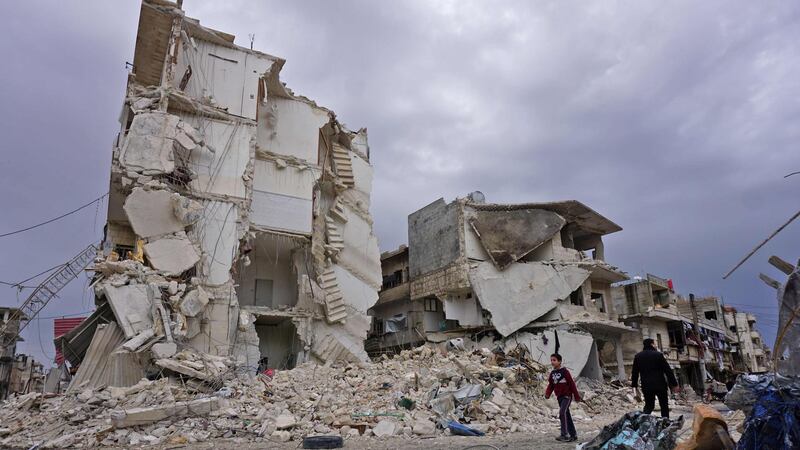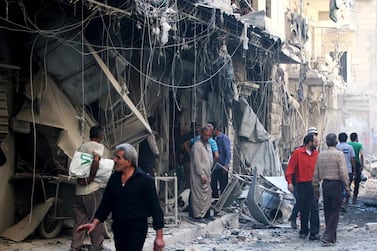In Syria’s last major rebel bastion, civilians living in an increasingly dangerous war zone say they feel abandoned by the international community and frustrated with what they see as Russian and Turkish plans to carve up their homeland.
“It’s been almost eight years and the Assad [regime] is still killing its people in front of the world without being held accountable,” Sohil Al Gherase told The National from the countryside of Idlib in northern Syria.
Displaced from their home in north Hama, he now lives with his wife and two daughters in Maarrat Al Nu'ma some 33 kilometres from Idlib city. The area is controlled by Free Syrian Army police force. Despite a de-escalation agreement brokered by Russia and Turkey last year that led to a period of relative calm, the war has started to return.
On Wednesday, the Syrian army and Russian aircraft attacked towns in Idlib marking the latest and most serious violation of the de-escalation deal. Reuters news agency reported that some 12 strikes targeted sites in Idlib city, including a civilian prison, which allowed dozens of inmates to escape. At least 10 civilians were killed and 45 injured.
Russia’s defence ministry confirmed the strikes and said they had been conducted in cooperation with Turkey. Elsewhere in Idlib province rescue workers said they put out fires caused by at least 80 rocket strikes and residents reported the use of white phosphorus – a chemical agent that burns at extremely high temperatures.
In recent months, the regime and its allies have shelled and carried out airstrikes against towns, hospitals and civilians. Internally, the de-escalation deal also saw an increase in inter-factional fighting between increasingly powerful hard line groups that dominate the enclave, home to an estimated 3 million people – at least 1.5 million of which have fled the government’s offensives elsewhere in the country.
Former Al Qaeda affiliate Hay’at Tahrir As Sham has effectively captured much of the region from a myriad of smaller rebel and hardline groups. Cashes between militias, assassinations and frequent shelling is still ongoing.
The guarantors of the de-escalation, Mr Al Gherase says, are now “setting up their troops to control the Syrian lands” but instead of safeguarding it they are the violators.
“The Sochi [deal] has been agreed and should have been applied on the ground, but we only have useless military bases that watch us die,” he said.
In Sochi last September, Russia and Turkey agreed to create a buffer zone in Idlib.
“It’s frustrating to see not only Russia is contributing to killing us as they used to but even Turkey is involved… What kind of deal is this?”
Ahmad Rahal, a former Syrian general who joined the opposition run Free Syrian Army after the start of the war, told The National that he believes Iran is the main force pushing the regime of Bashar Al Assad towards an offensive. “The Assad regime is being pushed by Iran to escalate the military campaign against Idlib in order to finish the [de-escalation agreement] and launch a war.”
Humanitarian groups warn that a military offensive to capture the region would be catastrophic to civilians in the enclave. Experts have warned that it could lead to thousands of deaths and unleash one of the largest single refugee displacements of the eight-year conflict.
Mr Rahal said that Turkey, which has a string of observation posts in northern Syria and has forces and allied militias on the ground, has not responded to violations of the Sochi agreement.
“I think that Turkey – who back the rebel in north Syria – has ordered its soldiers to hold their guns and be silent in front of any attacks,” Mr Rahal said.
The FSA has also not responded to the bombardments and airstrikes, he said. Rockets and shells have been fired into nearby regime control areas since the deal was struck, but mostly these have been blamed on hardline groups such as Hay’at Tahrir As Sham.
But Mr Rahal isn’t a fan of the deal. “From my view, it only implies a cowardly stance from many of the rebel factions leaders in this historic time in Syria,” he said.
But while the major powers are gambling over the fate of Idlib, civilians stuck in the middle are left in an increasingly difficult situation.
Mr Al Gherase says his life has been hard since his family were displaced. In 2015 his taxi was destroyed in an airstrike and since then he has sought work as a manual labourer to support his family.
His wife started working as a cleaner, becoming the main breadwinner. But the security situation has been deteriorating. His children have not been to school since January due to fighting.
Bahr Housin, who lives in the border town of Salqin, gave a bleak picture of the fighting.
“It has become the same as Assad’s attacks on Aleppo and Ghouta,” he said. “Hospitals and civil defence centres [have been targeted], they want people out of this area in order to launch a ground assault.”
He said everyone is confused about Turkey’s role in the de-escalation deal. “Ever since the deal was sorted, the security situation has gone downhill – the rebels and Al Nusra [Hay’at Tahrir As Sham] are fighting, there are internal clashes over the last few months and now the Russians and Assad are attacking us,” he said.
“I hope Turkey manages to halt the attacks, but we’re not optimistic about it. I can only hope for a miracle to stop this war and leave us to survive with what we have left.”
For Syrian civilians in Idlib, there is a growing sense that they have no say in the war and that the aims of the mass protests that sparked the uprising against the 48-year rule of the Al Assad dynasty has been lost in the fighting.






